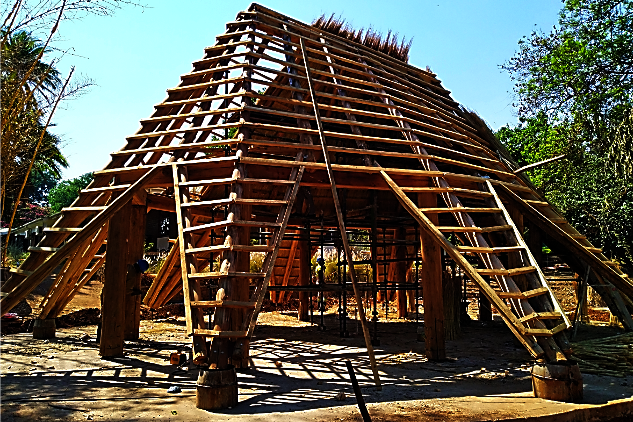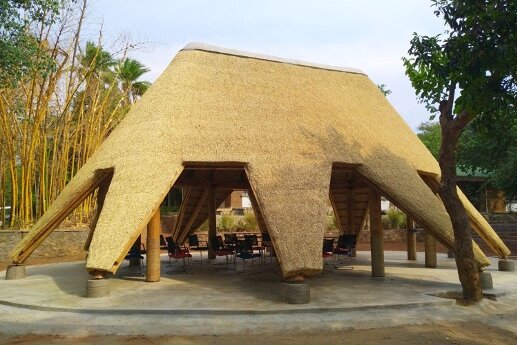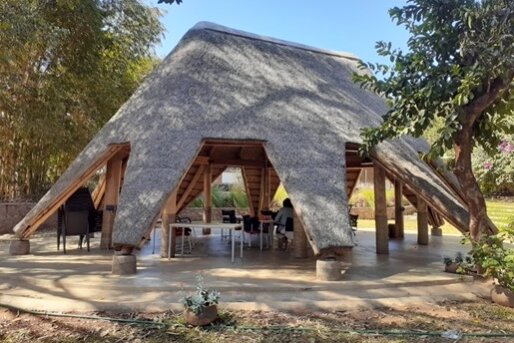Working together to strengthen biodiversity at our locations around the world
Protecting and promoting biodiversity is a core objective in many projects with partner countries. Measures to mitigate climate change also help to conserve biodiversity. GIZ does its bit for species protection at its own locations in Germany and abroad too. Enhancing biodiversity worldwide, and raising awareness and sharing knowledge among staff is one of the goals set out in GIZ’s Sustainability Programme. We have undertaken to develop and implement biodiversity strategies at our own properties in Germany and abroad by 2025. We intend to explore similar options for the premises we lease.
The criteria set out in GIZ’s invitations to tender also offer leverage for sustainability, ensuring that products such as office materials, printed materials, electricity and cleaning supplies are environmentally sound. This involves looking at the possible direct or indirect impacts of our supply chains on biodiversity and also considering the life cycle of the products we procure.
Purchasing timber products is a particularly critical matter. The staff of the Procurement and Contracting Division ensure compliance with international biodiversity standards. Sustainability is also prioritised in the canteen. For instance, our chefs also use fruit and vegetables that would normally be rejected because they do not meet the visual standards of the trade. And traditional locally grown fruit and vegetable varieties are used. Because yields are lower, they are rarely grown commercially, but they are vitally important for preserving biodiversity.
Biodiversity: wildflower-rich meadows instead of monotonous lawns
GIZ’s properties themselves provide an opportunity for promoting biodiversity. The buildings in Germany are mostly located at relatively small sites in cities, but nevertheless offer a wide range of opportunities to promote biodiversity in inner cities and to help connect habitats. The aim is to grass the roofs and include as many local insect-friendly plant species as possible in the outdoor areas. GIZ also wants to ensure that as little of the area as possible is sealed.
The Eschborn site has a 700-square-metre wildflower meadow with cornflowers, yellow sweet clover and cow parsley attracting beneficial insects. But GIZ not only provides food, but also a home for bees and bumblebees – in the form of insect hotels. Rare solitary bees – whose habitats are highly endangered – have settled there. These wild bees pollinate many wild plants and therefore preserve natural diversity. We are also constantly increasing our commitment to promoting biodiversity at the Kottenforst Campus in Bonn-Röttgen. The four buildings that are home to the Academy for International Cooperation (AIZ) border on Kottenforst Forest, which is part of the Rhineland Nature Park. Much of it is a protected area (Special Area of Conservation under the Habitats Directive). GIZ is helping to preserve traditional varieties of fruit trees indigenous to the area, for instance, as well as providing nesting places for birds, bats and insects, and cultivating wildflower meadows.
A role model for biodiversity conservation
GIZ intends to lead by example. The company has been part of the cross-sectoral Biodiversity in Good Company initiative since its inception. Companies from numerous industries have joined the initiative to work together to protect biodiversity and use it sustainably worldwide. In this way, GIZ supports the international Convention on Biological Diversity.
We build in line with high sustainability standards
Over the last few years, GIZ has invested a great deal in the maintenance of its existing buildings and the construction of new ones. We rely on sustainable design for both renovation work and new construction projects. In recent years, therefore, all of our new buildings at GIZ have been planned, completed and certified according to the rigorous German Sustainable Building Council (DGNB) Gold Standard.
Bonn Campus
GIZ is also investing in modern workplaces. Following the completion of a new six-storey building at the end of 2019, the Bonn Campus now has workplaces for 1,500 people – 500 of them in the neighbouring Meander Building that has been open since 2015. Like the Meander Building, the new property has obtained Gold Standard certification from the German Sustainable Building Council. The campus has been recognised for its energy efficiency, resource conservation and healthy working environment. In line with GIZ’s new worlds of work strategy, it offers team-working spaces, modern conference and video conference rooms, and quiet areas for concentrated work.
Approximately EUR 165 million has been invested in this construction project. Run entirely on green energy, it has been fitted with a photovoltaic system, including battery storage that primarily powers the charging stations and charging cabinets for e-mobility. Any surplus electricity will be fed into the national grid in return for a fee. A system of heat pumps with climate-neutral CO2 as a coolant uses energy from the groundwater to meet around 80 per cent of heating and cooling needs. LEDs are used as the primary source of lighting. Numerous charging stations for electric cars and e-bikes in the underground car park facilitate e-mobility among our employees. A large number of covered bike racks and biodiverse outdoor spaces with over 150 indigenous plant species, bee colonies, dry-stone walls that also provide habitats for flora and fauna, and a green roof, complete the sustainable building design.
Eschborn Campus
The work to convert the Eschborn site into a campus forged ahead in 2021. Spaces in the existing buildings were remodelled to allow for more flexible office use. At the same time, the plans for a new building were taken forward and fleshed out. The aim is to concentrate the buildings in an area to the west of the railway line.
A six-storey office building with around 900 workplaces on a plot of land of roughly 15,000 square metres is scheduled for completion by 2026. The building has been designed by Caramel, a Vienna-based firm of architects. Phoenix Real Estate Development GmbH will be the project developer.
The building complies with the German Sustainable Building Council’s high sustainability standards. The planned geothermal system, which extracts heat from the ground, and other measures, such as a photovoltaic system on the roof, will contribute to achieving these standards.
Breeding and nesting spaces for a range of animal species, including insects, are being created in the green areas and inner courtyards, which will further enhance the ecological value of the campus.
How GIZ promotes biodiversity and sustainable building abroad
Sustainable construction is not an explicit field of action in the Corporate Sustainability Handprint® (CSH). Most of GIZ’s buildings outside Germany are leased, which limits our scope for influencing their design. Many staff also work in offices of partner organisations. Nonetheless, the country directors and project managers in our partner countries also factor sustainability into their construction and leasing activities wherever possible. In Malawi, for example, a meeting room made of renewable raw materials was completed in 2021. The open wooden structure has a grass roof and benefits from natural light and ventilation. The office had already been renovated and insulated to a high standard. It also offers barrier-free access.
Information on the following Sustainable Development Goals (SDGs) can be found on this page:



